The Lilith Blog
September 12, 2018 by Kitty Zeldis
Anti-Semitism Among the WASP Elite
The idea for my novel Not Our Kind was born at Vassar College, where I was a student in the 1970s, where there was enough visible diversity to make a Jewish girl feel she was not alone. I encountered plenty of Jews, both students and faculty. Yet while I didn’t experience much overt anti-Semitism, I felt keenly aware that Vassar had historically excluded people like me—I was the “not our kind” of my eventual novel’s title.
I could feel it in the manners, the mores, the very air around me. Vassar was a WASP institution and bastion, and I knew I didn’t entirely belong. In fact, it was at Vassar that I acquired the nickname that became my pen name. I had commented to a friend that my Hebrew first name and Polish surname felt all wrong and that I should have been called Katherine Anne Worthington; he jokingly responded by calling me Kitty. It’s a name that stuck.
The anti-Semitism at Vassar was occasionally overt—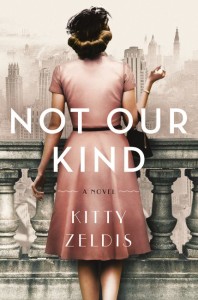 my freshman roommate casually noted, “Well, your people did murder our Lord,” a remark for which I then had no ready reply. But it was the more passive, almost nonchalant anti-Semitism that stung most. I remember an English lit class in which we’d been reading Ezra Pound and T.S. Eliot and I said that I found the stereotypical characterizations of Jews in their poetry—greedy, money-grubbing, hook nosed and so forth— upsetting. A fellow student raised his hand and said, “Oh, well, that’s what everyone was like back then,” as if that should have cancelled out my discomfort, and made it, somehow, all right. And then there was the memorable evening that I went to hear a lecture on 18th century Rococo painting that was to be given by a well-regarded scholar visiting from Germany. Before he came to the lectern, someone from the Art History department read a short bio by way of introduction. I don’t know what I expected to hear, but it surely wasn’t that during World War II, this man had been a high ranking official—a commander, a general, I don’t recall which—in the military. A Nazi, in other words, though the word was not actually said.
my freshman roommate casually noted, “Well, your people did murder our Lord,” a remark for which I then had no ready reply. But it was the more passive, almost nonchalant anti-Semitism that stung most. I remember an English lit class in which we’d been reading Ezra Pound and T.S. Eliot and I said that I found the stereotypical characterizations of Jews in their poetry—greedy, money-grubbing, hook nosed and so forth— upsetting. A fellow student raised his hand and said, “Oh, well, that’s what everyone was like back then,” as if that should have cancelled out my discomfort, and made it, somehow, all right. And then there was the memorable evening that I went to hear a lecture on 18th century Rococo painting that was to be given by a well-regarded scholar visiting from Germany. Before he came to the lectern, someone from the Art History department read a short bio by way of introduction. I don’t know what I expected to hear, but it surely wasn’t that during World War II, this man had been a high ranking official—a commander, a general, I don’t recall which—in the military. A Nazi, in other words, though the word was not actually said.
- 1 Comment
September 7, 2018 by Rokhl Kafrissen
Surfaces, Glitter… and Feminism? A Cinematic Ode to Matriarchy
There’s something radically painterly, about Sofia Bohanovich’s new documentary film Maison du Bonheur. Bohanovich spent a month in Paris living with the 77-year-old mother of a friend of hers, Juliane Sellam. The resulting film is as much an intoxicating series of images, both domestic and urbane, as it is a story about the still coquettish Mme. Sellam.
Narrative film is so dominant today that we forget how at the dawn of moving pictures, artists and theorists understood that film was like painting. They saw that it was in editing and montage—placing images next to each other in non-linear fashion—that the radical artistic potential of cinema could be found. It’s worth seeking out this film not only for its subject, but for how it demonstrates the flexibility and artistry of the camera.
- No Comments
September 6, 2018 by Erika Davis
My High Holiday Prayer: Stop Exploiting Jews of Color
About three months ago I invited over 20 Jews into my home for a havurah we call the Tacoma Shabbat Experiment. After my co-organizers and I finished leading Kabbalat Shabbat and the important bits of Ma’ariv, we sat down to a dinner that I’d prepared. I only planned for 20 people, and we had almost 30, but we found more plates, pulled up another table and folks sat on a hodgepodge of various lawn chairs and stools. Wine flowed, we tended to a pre-lit bonfire and folks meandered around the backyard my wife and I share with neighbors.
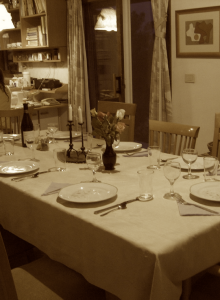 I was saying goodbye to one woman when a man I didn’t know approached me and asked what my connection to Judaism was. Slightly tipsy and really pissed off, I quickly reminded him that his question was hugely problematic. He leaned in to ask about Ethiopian Jews and Ugandan Jews, hoping for some validation. Instead of realizing his misstep he continued to ask my connection to Judaism, claiming to not understand my objection to his line of questioning. Thankfully, a white Jewish woman stepped in and I turned my back to him to continue to say goodbye to a friend.
I was saying goodbye to one woman when a man I didn’t know approached me and asked what my connection to Judaism was. Slightly tipsy and really pissed off, I quickly reminded him that his question was hugely problematic. He leaned in to ask about Ethiopian Jews and Ugandan Jews, hoping for some validation. Instead of realizing his misstep he continued to ask my connection to Judaism, claiming to not understand my objection to his line of questioning. Thankfully, a white Jewish woman stepped in and I turned my back to him to continue to say goodbye to a friend.
This was not the first time a white Jew has questioned the authenticity of my Judaism based on the color of my skin. It was, however, the first time a white Jew had done this to me in my own home.
- 1 Comment
September 5, 2018 by Sharrona Pearl
Rosh Hashanah Forgiveness for #MeToo Offenders? Not Yet.
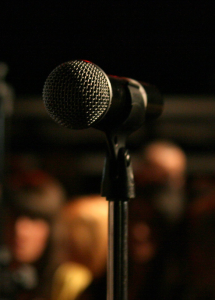 Will no one think of the poor abusers in the #metoo moment? Don’t they get a shot at redemption?
Will no one think of the poor abusers in the #metoo moment? Don’t they get a shot at redemption?
The question sounds like a joke, or maybe a gross parody at first. We’re nowhere near the point of spending enough time supporting and thinking about the victims survivors to feel anything close to an obligation to help their abusers. Not. Even. Close. But right now, that damn question (phrased in almost exactly this way — I’m not kidding!) is everywhere. As the summer ended, Louis C.K. quietly showcased a new set at the Comedy Cellar, his first since he admitted, and sort-of-apologized , for forcing aspiring female comics to watch him masturbate, the question of redemption is everywhere.
- No Comments
August 30, 2018 by Justine Orlovsky-Schnitzler
The Confederate Statue That Haunted My Campus Is Gone. I’m Glad.
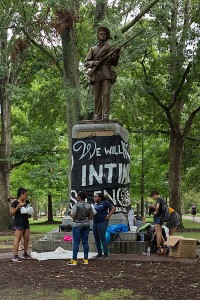 Last week, Silent Sam–one of the most visible Confederate monuments in the South–came off its pedestal. It was yanked into the dirt by protestors, finally at the mercy of the community that had suffered under Sam’s gaze for a little over a hundred years. The last video clips and photos of the evening showed a crew hauling the statue into a dump truck and driving off under the cover of darkness, leaving behind the ropes used to tear the metal loose.
Last week, Silent Sam–one of the most visible Confederate monuments in the South–came off its pedestal. It was yanked into the dirt by protestors, finally at the mercy of the community that had suffered under Sam’s gaze for a little over a hundred years. The last video clips and photos of the evening showed a crew hauling the statue into a dump truck and driving off under the cover of darkness, leaving behind the ropes used to tear the metal loose.
I can’t remember the first time I saw Sam. It must have been on a campus tour, though I was almost certainly distracted at the time by my overwhelming fear of graduating from high school and becoming a college student. But I do remember that on my first day at Carolina, up bright and early for a lecture in a course I would later drop, I passed by the statue, the base sprayed with vomit from drunken revelers celebrating the beginning of the semester. Tourists were posing in front of it anyway.
- No Comments
August 30, 2018 by Talia Lang
A Treasure Trove of Fiery Jewish Labor Activists You May Not Have Heard Of
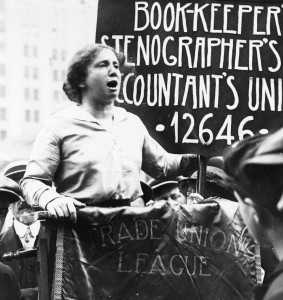
Rose Schneiderman
The directory of Jewish female labor activists is endless, from the better-known to the nearly invisible.
Many of these women are unknown outside of academic circles, their letters and speeches languishing in dusty academic archives. Ahead of this Labor Day, here is a list of Jewish female labor activists you never knew, or never knew were Jewish, or never knew said that, or never knew did that.
- No Comments
August 29, 2018 by Mindy Isser
Four Labor Reforms Feminists Should Be Fighting For This Year
In the US, Labor Day is generally just seen as a day off work (for the lucky ones!) reserved for cookouts and to say goodbye to summer.
But for women and caregivers of all genders, our labor is never-ending, and rarely appreciated. Outside of the home, women make less than men—for the same work— while women of color make even less than white women. Inside the home and even at work, our work is invisible, unpaid, and often thankless.
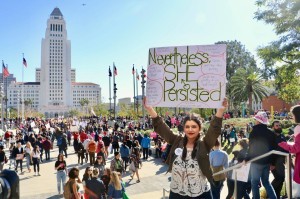 That’s why this Labor Day we’re going to highlight four ideas and policies that would improve the lives of working women across the country. All of these are completely doable, by the way–if we just have the imagination and courage to fight for them.
That’s why this Labor Day we’re going to highlight four ideas and policies that would improve the lives of working women across the country. All of these are completely doable, by the way–if we just have the imagination and courage to fight for them.
- No Comments
August 28, 2018 by Fran Hawthorne
The Ultra-Nationalist Polish Trolls—and Me
 “Grab attention on social media,” authors are constantly advised – especially if, like me, they are relative unknowns whose books have been published by small presses and they are expected to do pretty much all the marketing themselves.
“Grab attention on social media,” authors are constantly advised – especially if, like me, they are relative unknowns whose books have been published by small presses and they are expected to do pretty much all the marketing themselves.
Become a go-to part of the conversation on specific topics related to your book.Get in the conversation. Say something provocative. Get reTweeted.
After my debut novel “The Heirs” was published by Stephen F. Austin State University Press this spring, I dutifully put aside writing my next Great American Novel in order to jump full-throttle into PR outreach. Because “The Heirs” is about two Polish-American families in New Jersey – one Jewish, one Catholic – coming to terms with their post-Holocaust relationship, I particularly tried to Tweet on topics involving Poland, Judaism, and World War Two.
Thus, when I went to the Museum of Jewish Heritage in New York City, to see an exhibit of photos from the Lodz ghetto in Poland, I Tweeted: … It’s like seeing what my great-grandmother saw when she was walled in there. (Oops is it now illegal in Poland to say that?)
- No Comments
August 28, 2018 by Eleanor J. Bader
The Radical Potential of Fresh Food — and Why It Can Be So Hard to Come By
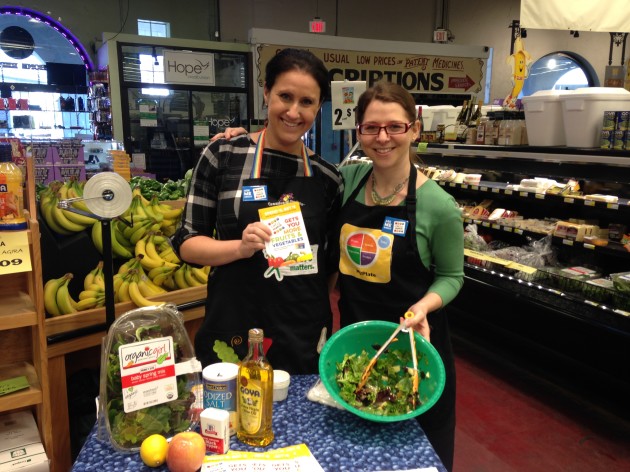 Ask Julia Koprak, Senior Associate at The Food Trust, an organization dedicated to ensuring that US residents have access to affordable, nutritious food, about the most surprising aspect of her work, and her answer is immediate. “People assume that folks need to take personal responsibility and eat healthy meals,” she says. Missing, she continues, is recognition of the fact that many US residents live in areas where grocery stores are few-and-far-between and farmer’s markets are either non-existent or unreachable, sometimes referred to as “food deserts.” “These areas exist in virtually every city and state in the country,” Koprak continues. “There are lots of places where people have to take three buses or drive 30 miles for food, places where the only nearby place to buy groceries is the gas station.”
Ask Julia Koprak, Senior Associate at The Food Trust, an organization dedicated to ensuring that US residents have access to affordable, nutritious food, about the most surprising aspect of her work, and her answer is immediate. “People assume that folks need to take personal responsibility and eat healthy meals,” she says. Missing, she continues, is recognition of the fact that many US residents live in areas where grocery stores are few-and-far-between and farmer’s markets are either non-existent or unreachable, sometimes referred to as “food deserts.” “These areas exist in virtually every city and state in the country,” Koprak continues. “There are lots of places where people have to take three buses or drive 30 miles for food, places where the only nearby place to buy groceries is the gas station.”
- No Comments
August 24, 2018 by Erica Brody
Women Are Speaking Up About Healthcare Inequality
Maybe you’ve heard the Bella Abzug story about how, as a US Congresswoman in the 1970s, she applied for an American Express card—and was told she could only have one if her husband signed for it.
She fought back. (So did her husband). Not just for her. But for all American women. This is hardly the achievement for which the Jewish Congresswoman — firebrand, feminist, activist, lawyer, (not to mention Zionist and member of Hadassah, where I hang my professional hat) — is best known, although it’s a popular one. But it’s a solid reminder that we can, together, cross some issues off our checklist for women’s equality.
- No Comments
 Please wait...
Please wait...